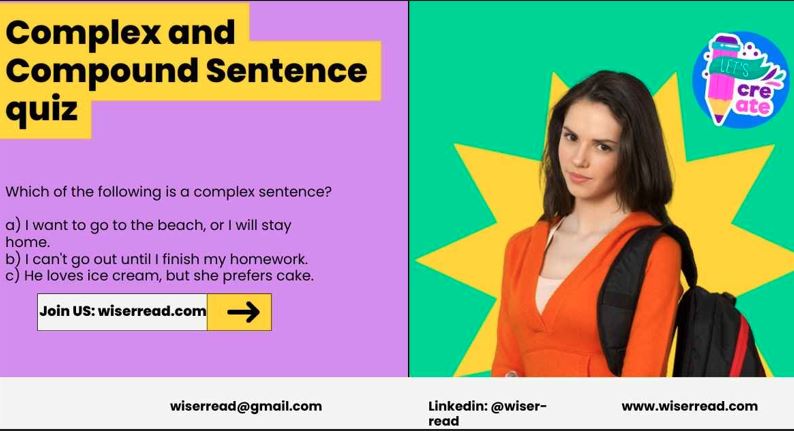Understanding complex and compound sentences is key to mastering sentence structure. A compound sentence connects two independent clauses with a conjunction.
A complex sentence combines an independent clause with a dependent one. Recognizing the difference helps improve clarity in writing. In this quiz, you’ll test your ability to spot and build both types. Ready to sharpen your skills?
Complex and Compound Sentences Quiz for students
Let’s start the quiz and rate yourself on the complex and compound sentences quiz.
Participate also English Grammar quizzes: Simple Sentence Quiz with Answers
Present Perfect Tense Quiz with Answers
Examples and exercises on compound and complex sentence
1. Which of the following is a compound sentence?
a) She wanted to go to the park, but it started raining.
b) Although it was raining, they went to the park.
c) After we finished our homework, we played outside.
Explanation: A compound sentence contains two independent clauses joined by a conjunction. In this case, “She wanted to go to the park” and “it started raining” are both independent clauses connected by “but.”
2. Which sentence is complex?
a) I went to the store, and I bought some apples.
b) I went to the store because I needed apples.
c) She ate lunch and then went to work.
Explanation: A complex sentence has an independent clause (“I went to the store”) and a dependent clause (“because I needed apples”) connected by a subordinating conjunction (“because”).
3. Identify the compound sentence:
a) I’ll go to the movies if I finish my homework.
b) She couldn’t find her keys, so she missed the bus.
c) Because he was tired, he went to bed early.
Explanation: This is a compound sentence because it has two independent clauses: “She couldn’t find her keys” and “She missed the bus,” connected by the conjunction “so.”
4. Which of the following is a complex sentence?
a) I want to go to the beach, or I will stay home.
b) I can’t go out until I finish my homework.
c) He loves ice cream, but she prefers cake.
Explanation: This is a complex sentence because it has an independent clause (“I can’t go out”) and a dependent clause (“until I finish my homework”) joined by a subordinating conjunction (“until”).
5. What is the function of a conjunction in a compound sentence?
a) To link an independent clause with a dependent clause.
b) To introduce a new idea.
c) To connect two independent clauses.
Explanation: In a compound sentence, a conjunction (like “but,” “and,” or “so”) connects two independent clauses, allowing them to function together in a single sentence.
Read and participate also: Present Simple Tense Quiz
Antonym and Synonym Quiz With Answers
FAQs on complex & compound sentence quizzes
What is the difference between a complex and a compound sentence?
- A complex sentence consists of one independent clause and at least one dependent clause, connected by a subordinating conjunction (e.g., because, although).
- A compound sentence consists of two independent clauses joined by a coordinating conjunction (e.g., and, but, or).
Can a compound sentence have more than two independent clauses?
Yes, a compound sentence can have more than two independent clauses. You can join three or more independent clauses using coordinating conjunctions, separated by commas or semicolons.
What is a dependent clause, and how does it differ from an independent clause?
- A dependent clause cannot stand alone as a complete sentence because it doesn’t express a full thought. It needs an independent clause to form a complete sentence (e.g., “Because I was tired”).
- An independent clause can stand alone as a complete sentence because it expresses a complete thought (e.g., “I went to bed early”).
How can I identify a complex sentence?
Look for a sentence that contains both an independent clause and at least one dependent clause. The dependent clause is usually introduced by subordinating conjunctions like “although,” “if,” “because,” or “when.”
What are the common conjunctions used in compound sentences?
Common conjunctions for compound sentences include for, and, nor, but, or, yet, and so. These are often remembered with the acronym FANBOYS.

